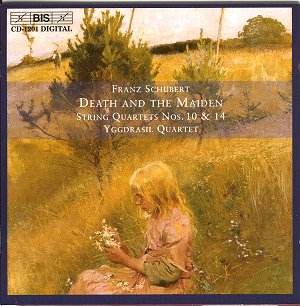Formed
in 1990, the Swedish Yggdrasil Quartet has already built up a
varied discography, ranging from the music of Jon Leifs (CD691)
to Berwald’s complete string quartets (CD759) and Shostakovich
(Quartets Nos. 2, 3, 7 and 8 are on CD913). Here it turns its
talents to Schubert, and it is the freshness of the interpretations
which impresses on this showing.
Quartets
Nos. 10 and 14 seem to make a particularly satisfying coupling
on disc, and the Yggdrasil are not alone in thinking this: the
Alban Berg Quartet on EMI (CDC5 56470-2), the Talich Quartet (Calliope
CAL9234) and the Henschel Quartet (Arte Nova 74321 59220-2) all
agree on the effectiveness of this pairing.
The
Tenth Quartet (1813), here placed second in the running order,
is generally successful. The fist movement emerges as an entertaining
and gentle diversion, but nevertheless a determined element underpins
the whole on this occasion. The Quartet’s sound is rich within
pianissimo at the opening, chords and textures are carefully balanced
throughout and the recording is clear but not overly-analytical
(but do I detect an edit at 5’38?). The tiny scherzo (1’40!) brings
remarkable quirky appoggiaturas contrasting with a scurrying,
throw-away Trio. The Adagio is sweetly-singing (although some
chord balances seem to throw too much emphasis onto inner voices);
the finale is busy, light and full of energy (interestingly, the
quartet opts to omit the repeat prescribed in my score).
With
D810, the field of competition widens, as do the emotional demands
(is this why there is more audible breathing/sniffing in this
piece?). Technical difficulties mean little or nothing to the
Yggdrasil, and there are some impressive moments. But they seem
not to grasp the overall structure, so that there is a loss of
intensity at a crucial juncture (9’58, first movement). Here the
closeness of the recording intrudes upon the listening experience,
also.
It
would appear that most rehearsal time went into the famous set
of variations which gives the quartet its nickname. Much thought
went into balance and dynamics (there is an especially good ppp
towards the end). Cellist Per Nyström brings out his best
cantabile for the occasion, and there is some truly delicate playing.
The
Scherzo is rhythmically buoyant, if not as innerly energised as
it could be, but the finale is taken at the Presto indicated.
Taken
as a whole, this makes a rewarding hour’s listening without knocking
the giants off their pedastals in D810 (try the Alban Berg Quartet
or the Busch Quartet, for example).
Colin
Clarke
